Christmas shopping: 'Speed is the new battleground'
- Published
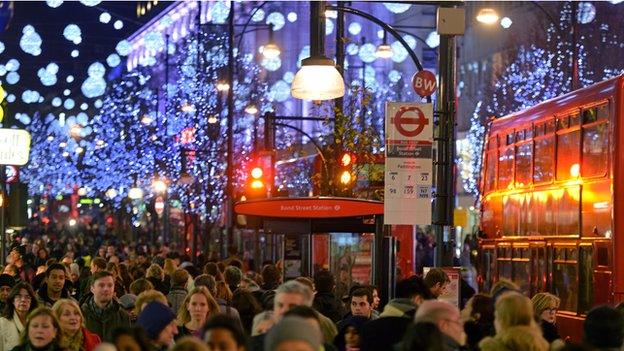
UK shoppers are forecast to spend more than £74bn this Christmas - 23% of that online
Missing a home delivery is pretty annoying, particularly when the "sorry we missed you" card is through the letterbox before we've even made it down the stairs.
And this Christmas, with UK shoppers set to spend more than £74bn - £17.4bn of this online - retailers' home delivery operations are going to come under immense pressure.
How have they been coping with Black Friday and Cyber Monday, and will Panic Buying Tuesday push them over the edge? (OK, I made that last one up.)
In short, they're relying on technology to come to the rescue.
'Omnichannel' challenge
High-tech operations such as Amazon, unencumbered by High Street shops, already seem to have it licked - on Black Friday it took orders for more than 5.5 million items in the UK - its busiest day on record.
"Speed is the new battleground," says Craig Sears-Black, UK managing director of Manhattan Associates, a software company specialising in warehouse management systems.
"These days orders have to be processed in two hours, not two days. The physical side of selling needs to be optimised."
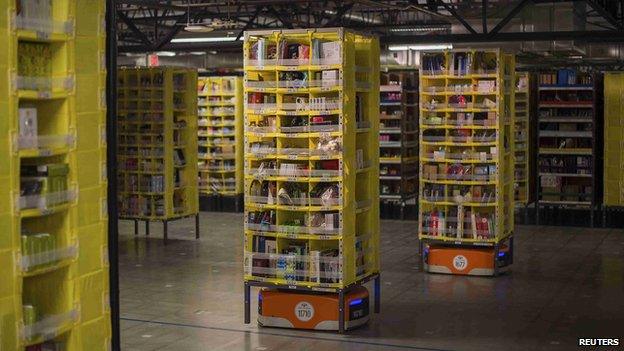
Can traditional retailers compete with Amazon's orange Kiva warehouse robots?
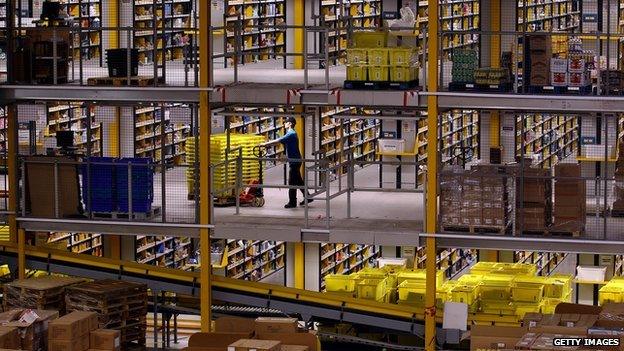
Staff in Amazon's Swansea fulfilment centre had to cope with the retailer's busiest ever day in the UK on Black Friday (28 November)
This is a huge challenge for "omnichannel" retailers trying to offer their customers a seamless shopping experience in-store, online and via mobile.
First, retailers need to know how much stock to buy in. This means "mining social media to pick up trends of where, when and what products the consumer is going to buy and how fast they're going to want it," says Mr Sears-Black.
Then they need to work out how best to source, distribute and deliver those products. And this sometimes means bypassing their own stores completely.
When you place your order online, the goods often do not come from the shop's own stock but from an outsourced supplier to save time.
"Supply chains that simply replenish store stock are grossly inefficient," he says.
Faster deliveries
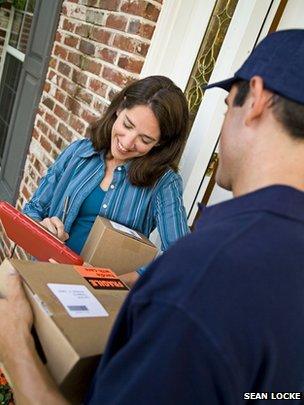
Not being in when a parcel arrives is a major annoyance for online shoppers
Making sure your goods arrive quickly and at a convenient time and place is key to keeping customers happy.
Technology is giving shoppers many more options.
"These days competition amongst carriers is giving consumers a lot more choice over when and where their parcels are delivered," says MetaPack founder and chief executive, Patrick Wall.
MetaPack handles the delivery part of online transactions for 80 of the UK's top 100 retailers, integrating about 240 delivery companies worldwide into its system.
When you choose your delivery options, MetaPack works out which are available to you in your location and for the goods you've ordered.
It decides which carrier represents best value for the retailer and handles all the tracking data so everyone can know exactly where the parcel is on its journey at any time.
Not so long ago, your delivery slot was morning or afternoon if you were lucky. Now two-hour and even one-hour windows are becoming commonplace thanks to better warehouse scanning technology, automated route planning and GPS tracking of the delivery vans and lorries.
We can pick up our parcels from a neighbour, local post office, newsagent or one of a growing number of secure locker services, such as InPost, myHermes, myByBox and Amazon.
In the UK, there are about 25,000 such "click-and-collect" locations.
InPost chairman Jonathan Smith believes that while free delivery remains a big incentive for online shoppers, convenience is increasingly important.
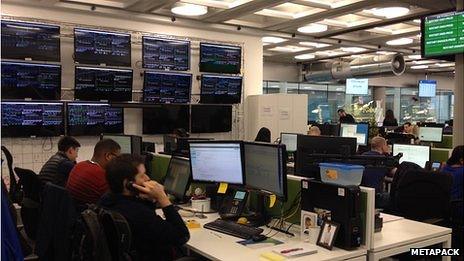
MetaPack's data centre keeps track of millions of parcels
"Our research shows that shoppers have missed an average of three home deliveries in the last 12 months alone," he says, "and our data indicates that nearly 60% of parcels from our lockers are collected between 7pm-7am at night."
Order handling
It's annoying enough when your parcel is late or you miss the delivery - being sent the wrong thing is infuriating.
So "pick accuracy" as they call it, is essential if retailers want to keep customers loyal.
Simon Deane, supply chain services director for Wincanton, which handles warehousing and home delivery for large retailers, including Marks & Spencer, says: "Pick accuracy is now 99.5% and above thanks to increasing levels of automation.
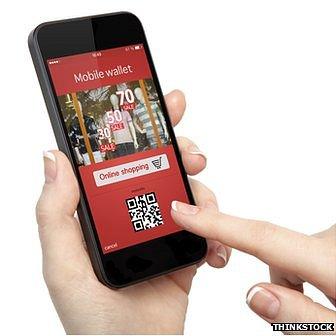
UK shoppers are forecast to spend more than £17bn online and via mobile this Christmas
"We simply couldn't cope with the sheer volume of single online purchases without it."
This involves a variety of technologies including shuttles and conveyor belts, robotic arms selecting products, as well as headsets for staff telling them where to go in the warehouse.
Companies such as Wincanton are also experimenting with augmented reality technologies, such as Google Glass and other "heads-up displays" that overlay directions and stock information on warehouse pickers' field of vision.
Tesco already operates "dark stores" entirely controlled by computers and fully automated.
The lights don't need to be on because as long as the system knows the size, shape and weight of the goods it doesn't need to see them the way humans do.
And Amazon is rolling out its fleet of Kiva robots that can carry stacks of goods directly to staff in its giant fulfilment centres. This saves time and money.
Taking stock
But automation relies on very accurate inventory data updated in real time, says Mr Deane.
And all the computer systems tracking the goods from the supplier to the retailer or warehouse, then on to the customer, have to be integrated for all this to work.
"Daily updating of stock levels is no longer good enough. But real-time inventory management requires a big investment," he says.
Analysing accurate data also helps warehouses lay out the goods in the most efficient way, with the most commonly ordered goods easiest to reach, for example.
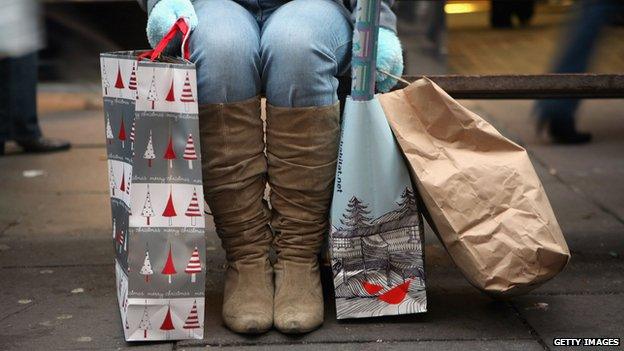
Retailers running out of stock is one of several bugbears for Christmas shoppers, along with missed and late deliveries
Ultimately, successful retailing is all about data accuracy. But many retailers don't even know how much stock they have in-store.
"Stock accuracy can be as low as 50%," says Mr Sears-Black.
Older retail stock systems can't keep track of how many products are in the process of being bought, broken, lost or stolen.
"This is why the poorest performing brands have disappeared," he says.
Future shopping
As internet shopping continues to grow in popularity - about 15-20% of all retail sales are now online - retailers will have to continue innovating to cope with demand.
But the future is bright for shoppers, technology companies believe.
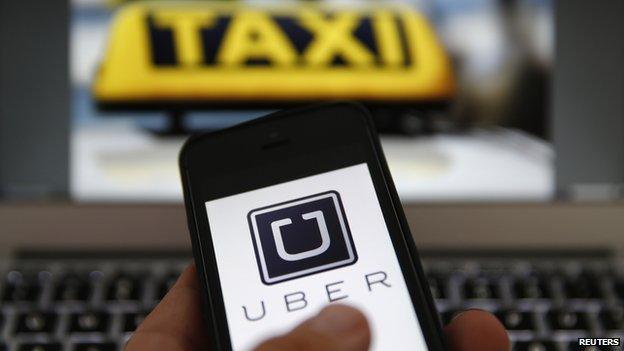
Taxi service Uber is already experimenting with delivery services
"Our deliveries are going to get better and better - maybe down to a 30-minute time slot," says MetaPack's Mr Wall, "and the network of places where you can pick up your parcel and drop it off is going to get wider."
Other tech-driven innovations will include "in-flight change", he believes, whereby shoppers can specify a different delivery location even while the parcel is mid-transit.
And taxi services, like Uber, could also be called upon to deliver parcels to alternative locations, he says.